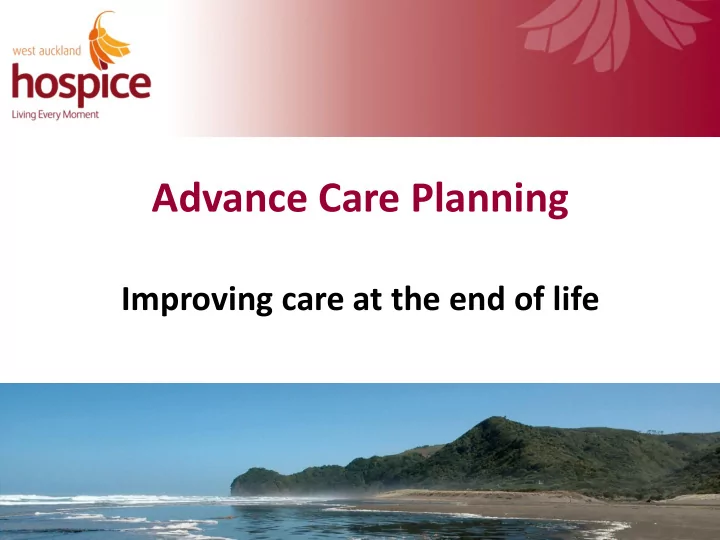

Advance Care Planning Improving care at the end of life
To Tatou Reo – Our Voice Advance Care Planning ‘ Planning for the medical care and treatment we want in the future ’ ACP Co-operative booklet 2013
Why ACP? Increased interventions such as ventilators and feeding tubes mean more options People are concerned about the possibility of a prolonged and painful dying process Making treatment choices known in advance provides clarity for family and care teams Services vary between health settings and this can lead to confusion
Think about this …. You have a life-threatening illness or have been in a serious accident. Your mind or body, or both, are badly affected and you are close to death …
What would you want to have happen? Would you want to be kept comfortable, with your pain controlled and other unpleasant symptoms managed, while allowing a natural death to occur? Or would you want active life-support treatments?
Things to consider … ‘We need to consider, when we would want to change the focus from life support to comfort care? People need to consider who they would want to have there and how to talk to medical staff about what they want’ ACP Co-operative Booklet 2013
Who can do an ACP? Any capable [mentally competent] adult can engage in making a plan for personal health care decisions in the event that they become incapable [legally incompetent] to personally direct their own health care
A matter of timing ACP conversations should ideally be held before a health crisis occurs. This way the person has time to consider their choices and talk with family and friends No-one is under pressure to do an ACP – it is not an ethical or legal requirement
It’s not about giving up hope Its’ about making sure that we all have a common understanding of the person’s wishes and preferences. For example: where someone wants to be cared for, who they want involved and what treatments they would or wouldn’t want. This shared understanding is the key benefit of the ACP process
What does it all mean for us? It’s an opportunity for us to understand what is important to the people we care for Through the conversation process we develop a shared understanding between ourselves and our patients It makes it easier for us to advocate on behalf of people that we care for
Upskilling ourselves The very best place to start is on the acp website www.advancecareplanning.org.nz The level 1 training acpcoop@adhb.govt.nz
Frequently asked questions People often want to know if they can change their ACP. As long as they are competent, they can do so as many times as they wish Often they also want to know how to go about appointing someone to make decisions for them. It is important that they receive information about the Enduring Power of Attorney process
Some helpful places The Public Trust Organisation National free phone – 0800 371 471 Community Law Centres Free phone – 0800 529 463 Advance Care Planning Cooperative acpcoop@adhb.govt.nz
Recommend
More recommend